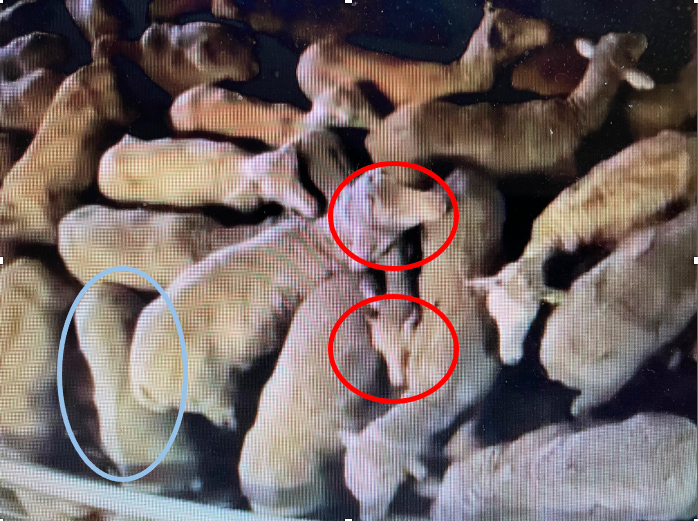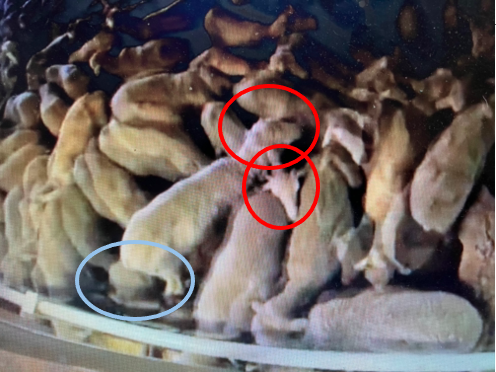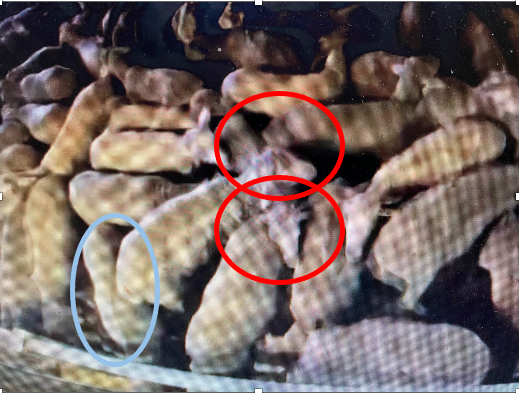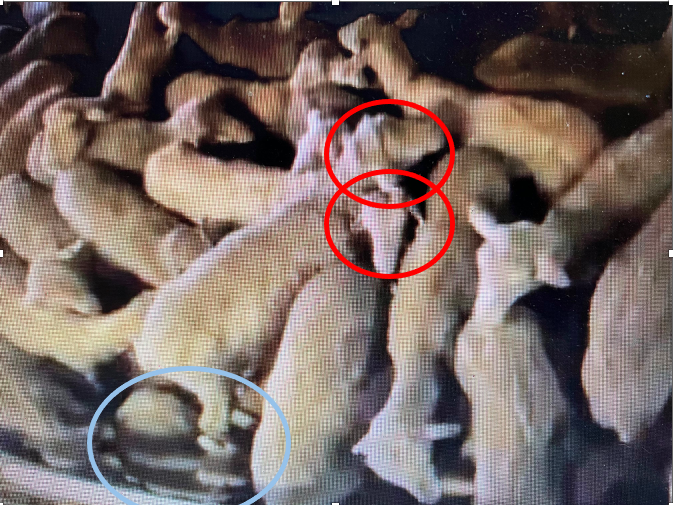|
We continue to check the reported facts on Landline 28.5:
Reporter Mark Bennett stated that "most of the animals were able to freely move around". 1. Very few people viewing the images at the following marks: '24:17, '24:39, '29:57, '30:10, '30:21, '31:13 would find that very plausible. It was also interesting that the sheep seemed to have less room on the lower decks despite the fact that these sheep will have the longest voyages - less lighting for filming so less show for the ABC cameras? 2. In one of the time-lapse movies , it is quite clear that some of these sheep do not move around freely and remain in remarkably constant positions whilst they get bumped and jostled. For example, follow the sheep with the red circles through some of the footage. Yep, just different uncomfortable postures at all time periods....not to mention trampling of the down/reclining sheep in the lower left corner (blue circle) 3. It is evident from many of the frames that contrary to the comments made by the onboard veterinarian and implied by the reporter that animals all have room to lie down comfortably at the same time if they choose, they dont - not unless they are the most valuable stock, the lambs. 4. There was the repetition of the "2 week voyage" timeframe even though some of those sheep on the lower decks appear more cramped and will have had 23-24 days onboard before unloading. Did the ABC not critically assess their own footage which is quite contrary to the commentary provided by the reporter??
0 Comments
VALE continues its fact check on the ABC Landline footage of a voyage on the Al Messilah
1. The stockperson stated that live export was necessary as "these countries need to be fed". Kuwait ranks about 36th on the world wealth list, just behind NZ on 35. They have supermarkets stocking Australian sheep meat. If their population needs to be fed, they can import more meat. 2. Worryingly, for this very short voyage, many sheep were reported to be receiving antibiotics. In Australia, to ensure no antimicrobial residues present (ie to protect human health), these animals would have to have a minimum of 28 days withholding depending on the antibiotics. Yet these sheep do not have individual identification so can be slaughtered immediately after unloading as opposed to Australian meat exports which have strict residue compliance. So, we provide them with some protein and who cares if they get antimicrobial resistance or die of an allergic reaction...all of which can be avoided with exported sheepmeat. It would have been prudent for the reporter to raise questions about the necessity of live sheep for "protein" in a rich country like Kuwait and also to consider the residues. ABC should have posed the question "Is it really better to have antibiotic laden meat from Australian live sheep 'feeding these countries' vs antibiotic free Australian sheepmeat"? And, "Is there any possibility of reputational damage to our considerably more profitable, antibiotic free export meat trade? VALE continues its media check on Landline reporting of a live export sheep voyage. Here is Landline Fact Check Installment 2:
1. "23:34 "Teams of spotters look out for the sick or injured drafting off those not fit for travel". This suggests a number of people in a number of groups. Is this correct? Seems unlikely as just not any video evidence of teams ... just one man and another person on the drafting gate. Even if there were 4 people, this is hardly "teams", ABC. 2. "23:34 "Teams of spotters look out for the sick or injured drafting off those not fit for travel". Check the footage carefully. While the "spotter" reaches for his pencil to record the reject, at least one (possibly more) lame sheep hop on by, unnoticed. Not such a stringent process it seems if this happens in 2 seconds of footage! 3. "23:34 "Teams of spotters look out for the sick or injured drafting off those not fit for travel". The clearest evidence of the failure is the 60 sick lambs identified onboard on Day 1 and the other 50 on the next 2 days also. Odd that the ABC didn't question how this was compliant with ASEL or how good the "spotting" process was. There is no doubt from this report (if numbers correct) that ill sheep which would not have been compliant with ASEL were loaded onto this ship. Was it due to the trucking temperatures on 9 Jan 23 and 10 Jan 23, 38 degrees C and 36 degrees C respectively or were they already sick when loaded? Shame the ABC didn't have the analytic skill to check their facts against the footage. The exporters want us to believe animal welfare is their priority and all problems fixed but significant numbers of sick sheep still get loaded onto the ship. So much for the Farmer Review – over 10 years ago – with same problems evident even on these limited grabs! After years of being denied access to live export ships, Albany ABC reporter Mark Bennett is suddenly granted access onto a ship. Conveniently, this is in January, one of the coolest months of export with the best, summer-acclimatised sheep. (Note that they didn't invite him in September, October or May...well done Livestock Collective!)
VALE watched with keen interests as we thought we could do a fact check on the report. Here is Landline Fact Check Installment 1. 1. A voyage of 14 days: Sorry Mark, but the Al Messilah left Fremantle on 11 January and arrived in Shuwaikh Port on 25 January. So, yes, 14 days, not including the loading and the unloading of the sheep. BUT the sheep that were unloaded in Muscat on 3 February would have been the first sheep on board in Fremantle (10-11 January) so they would have been on board 23-24 days, 10 days longer than Mark's twice stated 14 days. And..if the ABC had checked, they would have found that from Jan 2013 to Dec 2022, there were only two trips from Freo to Kuwait achieved in 14 days (and none shorter than this). Thus, this became the third shortest trip since Jan 2013. Notably all 3 14 day journeys were to the Northern Hemisphere winter (leaving Fremantle on 7.12.2019 and 3.3.2021). 2. The real clanger is at the 24:46 minute mark showing sheep going into bare floored pens: "This is where the animals will eat, defaecate and sleep on a bed of sawdust". Mark, we aren't sure where you were looking but sheep in routine pens are not on sawdust as the loading footage clearly showed. The only sawdust will have been in the hospital pens (where Dr Reben fell over), the cattle pens, and we also saw some where the necropsies were being done. So a preliminary check shows that the ABC did not check their facts. We will trickle feed our long list of observations over the next few days. The livestock carrier Nine Eagle suffered a major engine failure in Darwin, on May 15, while loaded with approximately 1,800 cattle. The MV Nine Eagle, built in 2006, is a converted general cargo ship (industry so often claims purpose built vessels...!) currently flagged by Panama. The vessel was headed to Indonesia on charter for Perth-based company Livestock Shipping Services. After 6 days on board and with no way of cleaning out the faeces, cattle were finally unloaded on May 21 and transported to a pre-export quarantine facility south of Darwin.
How very interesting...farmers demanded Bali tourists dispose of their thongs after their holiday due to foot and mouth disease risk, yet a cattle ship which only left Indonesia on 6th May is allowed to have animals unloaded from a potentially contaminated ship. Possibly a little more risk than tourist thongs but not a murmur from industry.....lets face it, its live ex and it trumps any Australian biosecurity. And ultimately, it yet again shows the monumental risky nature of live ex...these cattle were lucky the ship broke down in port and not on the open ocean. For full story see: https://www.marinelink.com/news/cattle-offloaded-disable-livestock-505279 Livestock producers and shippers are constantly telling us they follow world's best practice because they care so much about animal welfare. So what happens when they arent made to follow those standards? Surely they care so much they would follow those standards anyway? Seemingly not.
In a very revealing interview with the WA Chief Vet Michelle Rodin, it has emerged that the cattle sent from Darwin to Broome, a 5 day journey (ie longer than some export voyages to Indonesia) do not fall under ASEL. So producers and shippers loaded up whatever they wanted to - reportedly including late pregnant animals, horned animals etc...with who knows what space allowances, bedding or food. Outcome - 31 cattle already dead out of a shipment of 1200: 5 dying on the voyage, 18 dying shortly after arrival and the rest apparently post-cyclone (convenient?!). State shipping does not require that ASEL has to be followed so these really caring caring people who follow world's best practice, suddenly didnt care so much and just did what they wanted. What a great exercise in public trust.... and ..."story-telling". Hear the interview: https://www.abc.net.au/radio/programs/nt-country-hour/nt-country-hour/102268140 |
Archives
June 2024
Categories |




 RSS Feed
RSS Feed
